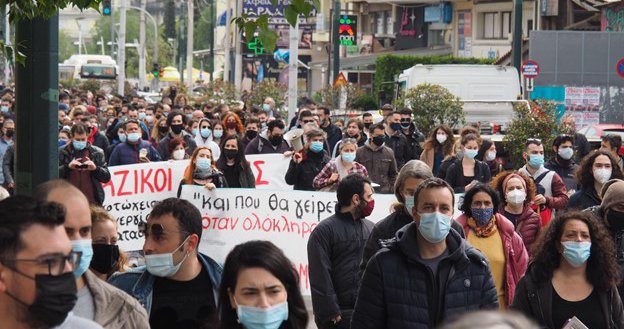
But the management of the second wave was less successful and Greece’s number of new infections skyrocketed by November 2020. This led the government to re-impose an even stricter curfew. Since summer 2020, there has been a not necessarily politicized opposition to the lockdown by groups of youths gathering and socializing in squares and parks, especially in Athens and Thessaloniki. Meanwhile, the latest controversy over the hunger strike and state of health of Dimitris Koufontinas – a member of the far-Left, urban guerrilla group, Revolutionary Organization 17 November, who was convicted on terrorism charges – has also revitalized the grassroots activism of anarchist and Trotskyist groupings.
Against the background of these developments, the recent toughening of law and order policies by the government can be interpreted as an endeavour by New Democracy’s right-wing faction to enhance the groupness of the party’s bases of support – the more conservative and right-wing ones, in particular. To this one should add a state of perplexity (if not confusion), among the governmental agencies over the rising number of infections and how to handle this bleak situation.
However, as seen in Serbia and Bulgaria, the legitimization of stricter law and order policies, with the alleged objective of combating COVID-19, amid already tense political environments, may lead to an increase in non-compliance, if not civil unrest. This argument acquires a greater weight when tougher policies may even result in acts of police violence such as the recent incidents in Nea Smyrni.
What next?
The past few years have seen the inability of the Radical Left Coalition (SYRIZA) to mount a coherent and effective opposition campaign against New Democracy. According to a series of polls, SYRIZA’s popularity hovered around 25-27% between 2020 and 2021, while New Democracy’s was between 45 and 47%.
New Democracy’s solid lead, especially following the management of the first wave of COVID-19, has emboldened the government to proceed with its tougher ‘law and order’ policies. Intellectuals affiliated to SYRIZA or the broader Left have recently began more vocally accusing New Democracy of a decisive shift further to the Right, which they compare to that of Viktor Orbán’s FIDESZ party in Hungary.
Despite the qualitative differences in their political origins and the national contexts, parties such as FIDESZ in Hungary or VMRO-DPMNE in the Republic of North Macedonia, have, like New Democracy, operated as ‘umbrella organizations’ that hosted conservative and liberal segments. The gradual overtaking (or ‘hijacking’) of the entire party organization by right-wing cohorts can be enacted during times of ground-breaking changes in global politics and, ideally, amid a crisis. Orbán’s FIDESZ provides an appropriate example: the period extending from the Hungarian economic crisis (2006-08) to the European migration crisis (2015-16) saw the consolidated shift of the party further to the Right.
In the case of New Democracy, the necessity to control a large population amid a global health crisis facilitated the engagement of the right-wing faction and enhanced its status within the party structures – as reflected in the systemization of stricter law and order policies. Even if not tantamount to a firm shift of New Democracy further to the Right, the upgraded status of the governing party’s right-wing faction freezes any prospects for the liberalization of the police and security forces and exacerbates the polarization of society along ‘Right vs Left’ cleavages. Taking into account the persisting claims of far-Right sympathies inside the ranks of the Greek police (e.g. the electoral appeal of Golden Dawn among quite a few officers until not so long ago), this turn may ultimately foment an escalation in the clashes with militant anarchist (and other) groupings on the street level.
This post was originally published on Radio Free.